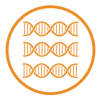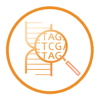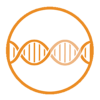Current standard of care approaches for genetic testing may include targeted panels (single gene or multigene panels), chromosomal microarray and/or whole-exome sequencing. Due to their limitations, these approaches have a lower likelihood of finding a diagnosis when compared to WGS in some patient populations. Across the different variant types in the human genome, WGS identifies these with greater resolution and accuracy compared to standard methods giving healthcare providers a single analysis with the most comprehensive results.
Genome Coverage


Targeted panels focus on a selection of genes that are typically associated with an a specific phenotype. Composed of single genes or multigene panels, it may not allow for examination of new and emerging targets.

Chromosomal microarrays (CMA) are designed to detect copy number variants (CNV). CMA analyzes < 0.01% of the genome, missing opportunities to find underlying genetic causes for disease.1

Whole-exome sequencing (WES) sequences the protein coding regions of genes that account for around 2% of the genome, leaving 98% unexplored. WES has limited capability to detect CNVs or structural variants (SV), and does not evaluate repeat expansions or paralogs.2-10

Whole-genome sequencing provides the most comprehensive analysis of genomic variants among all clinical genetic testing methods. As a single test, it offers more information and can be completed more quickly than multiple iterative tests.
WGS Overcomes Shortcomings of Iterative Testing
There are a multitude of tests to investigate genetic causes of rare diseases. Each have strengths and weaknesses in what they can detect and how much of the genome they can cover. Inconclusive results from initial tests with targeted panels, CMA or WES, can prompt more genetic tests adding complexity to the diagnostic workup and utilizing more resources.
Only one approach, WGS, can evaluate nearly the entire genome with speed and efficiency in a single test.
Iterative testing can be less efficient and more costly.

What makes WGS the right test
Move

traditional methods
Endless Insights with WGS
Approximately 250 new genes with disease-causing variation are added to the literature annually.16 This rapid rate of genetic discovery can render current standard approaches outdated and incomplete. Among all clinical genomic testing methods, whole-genome sequencing outperforms analysis of genomic variants with greater capabilities to analyze diverse variant classes across the genome.
References
- Illumina. Data on file. March 2022.
- Lionel AC, Costain G, Monfared N, et al. Improved diagnostic yield compared with targeted gene sequencing panels suggests a role for whole-genome sequencing as a first-tier genetic test. Genet Med. 2018;20(4):435-443. doi:10.1038/gim.2017.119
- Gross AM, Ajay SS, Rajan V, et al. Copy-number variants in clinical genome sequencing: deployment and interpretation for rare and undiagnosed disease. Genet Med. 2019;21(5):1121-1130. doi:10.1038/s41436-018-0295-y
- Chen X, Schulz-Trieglaff O, Shaw R, et al. Manta: rapid detection of structural variants and indels for germline and cancer sequencing applications. Bioinformatics. 2016;32(8):1220-1222. doi:10.1093/bioinformatics/btv710
- Carss KJ, Arno G, Erwood M, et al. Comprehensive Rare Variant Analysis via Whole-Genome Sequencing to Determine the Molecular Pathology of Inherited Retinal Disease. Am J Hum Genet. 2017;100(1):75-90. doi:10.1016/j.ajhg.2016.12.003
- Dolzhenko E, van Vugt JJFA, Shaw RJ, et al. Detection of long repeat expansions from PCR-free whole-genome sequence data. Genome Res. 2017;27(11):1895-1903. doi:10.1101/gr.225672.117
- Alfares A, Aloraini T, Subaie LA, et al. Whole-genome sequencing offers additional but limited clinical utility compared with reanalysis of whole-exome sequencing. Genet Med. 2018;20(11):1328-1333. doi:10.1038/gim.2018.41
- van Kuilenburg ABP, Tarailo-Graovac M, Richmond PA, et al. Glutaminase Deficiency Caused by Short Tandem Repeat Expansion in GLS. N Engl J Med. 2019;380(15):1433-1441. doi:10.1056/NEJMoa1806627
- Ibañez K, Polke J, Hagelstrom RT, et al. Whole genome sequencing for the diagnosis of neurological repeat expansion disorders in the UK: a retrospective diagnostic accuracy and prospective clinical validation study. Lancet Neurol. 2022;21(3):234-245. doi:10.1016/S1474-4422(21)0046-2
- Chen X, Sanchis-Juan A, French CE, et al. Spinal muscular atrophy diagnosis and carrier screening from genome sequencing data. Genet Med. 2020;22(5):945-953. doi:10.1038/s41436-020-0754-0
- French CE, Delon I, Dolling H, et al. Whole genome sequencing reveals that genetic conditions are frequent in intensively ill children. Intensive Care Med. 2019;45(5):627-636. doi:10.1007/s00134-019-05552-x
- Manickam K, McClain MR, Demmer LA, et al. Exome and genome sequencing for pediatric patients with congenital anomalies or intellectual disability: an evidence-based clinical guideline of the American College of Medical Genetics and Genomics (ACMG). Genet Med. 2021;23(11):2029-2037. doi:10.1038/s41436-021-01242-6
- NICUSeq Study Group, Krantz ID, Medne L, et al. Effect of Whole-Genome Sequencing on the Clinical Management of Acutely Ill Infants With Suspected Genetic Disease: A Randomized Clinical Trial. JAMA Pediatr. 2021;175(12):1218-1226. doi:10.1001/jamapediatrics.2021.3496
- Sanghvi RV, Buhay CJ, Powell BC, et al. Characterizing reduced coverage regions through comparison of exome and genome sequencing data across 10 centers. Genet Med. 2018;20(8):855-866. doi:10.1038/gim.2017.192
- Lindstrand A, Eisfeldt J, Pettersson M, et al. From cytogenetics to cytogenomics: whole-genome sequencing as a first-line test comprehensively captures the diverse spectrum of disease-causing genetic variation underlying intellectual disability. Genome Med. 2019;11(1):68. doi:10.1186/s13073-019-0675-1
- Farnaes L, Hildreth A, Sweeney NM, et al. Rapid whole-genome sequencing decreases infant morbidity and cost of hospitalization. NPJ Genom Med. 2018;3:10. doi:10.1038/s41525-018-0049-4


